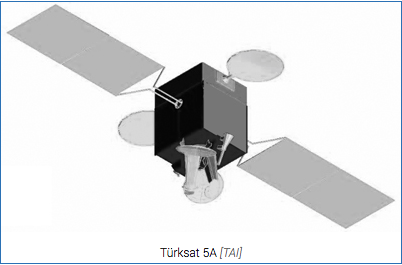[SatNews] Turkey is on the verge of a breakthrough in communications, intelligence and surveillance satellites.
Turkey's first satellite center, to be opened this month at the Akinci Air Force Base in Ankara, will allow the manufacture and testing of satellites, making Turkey one of only 12 countries to be able to do so.
 Turkey is on the verge of a breakthrough in communications, intelligence and surveillance satellites. After the 4B satellite launched this year, the Satellite Assembly and Integration Test Center (UMET), where Turkey's new satellite, TÜRKSAT 5A, will be manufactured and tested in, has been completed. The center, which will open in August, is situated in Akinci Air Force Base in Ankara. Turkey's first satellite center, in which TÜRKSAT 5A, 5B and 5C satellites will be manufactured in by using only national resources, will open with a grand ceremony.
Turkey is on the verge of a breakthrough in communications, intelligence and surveillance satellites. After the 4B satellite launched this year, the Satellite Assembly and Integration Test Center (UMET), where Turkey's new satellite, TÜRKSAT 5A, will be manufactured and tested in, has been completed. The center, which will open in August, is situated in Akinci Air Force Base in Ankara. Turkey's first satellite center, in which TÜRKSAT 5A, 5B and 5C satellites will be manufactured in by using only national resources, will open with a grand ceremony.The operating rights of the center have been granted to state-run Turkish Aerospace Industries (TAI), and after the testing of Earth observation and communications satellite are completed, the satellites will be launched. UMET has been financed by the Undersecretariat for Defense Industries. TÜRKSAT 5A, 5B and 5C will be manufactured by TAI in UMET and is planned to be launched in 2015.
Turkey’s procurement agency, the Undersecretariat for Defense Industries (SSM), in early July signed a contract with the country’s national missile manufacturer, Roketsan, to build the Turkish Satellite Launching System (UFS) for pre-conceptual design work.
According to a report by the U.S. defense magazine Defense News, Turkey is planning to construct its first satellite launching center. “The Undersecretariat for Defense Industries (SSM), in early July signed a contract with the country’s national missile manufacturer, Roketsan, to build the Turkish Satellite Launching System (UFS) for pre-conceptual design work. Roketsan will design the UFS to be capable of launching, initially, satellites into low earth orbit (500 to 700 kilometers) through a launching center the company will build and the Turkish Air Force will operate” the report said.
A Roketsan official said they intended to end the country’s foreign dependency on launching military and [civilian] communications satellites. On the other hand, an SSM official stated that one reason for the UFS project was the aim towards a compact space program, including a national launcher.

